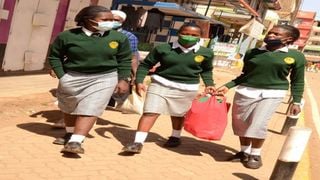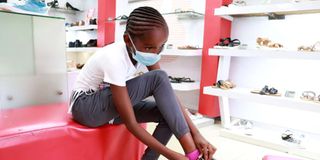
Secondary school students in Nyahururu town, Laikipia County heading back to school on January 03, 2020. File | Nation Media Group
| Joseph Kuria | Nation Media GroupNews
Premium
Broke parents feel the pinch as prices soar in back-to-school rush
What you need to know:
- Transport CS James Macharia told the media that matatu owners had agreed not to hike fares.
- School managers were also grappling with how to enforce social distancing in congested institutions.
Some matatu operators yesterday defied a government directive not to increase fares as they cashed in on a surge in commuters ahead schools’ reopening today.
It added to the pain for parents, who had to also contend with high prices of books and school uniforms, which most guardians said they had been forced to buy as their children had outgrown their previous attire.
And school managers were also grappling with how to enforce social distancing in congested institutions, with some converting dining halls and libraries into classrooms.
Commuters in Samburu complained of increased bus fare. Matatus plying the Maralal-Nyahururu-Nakuru route charged Sh800 and Sh1, 100 instead of the usual Sh500 and Sh700 respectively.
In the North Rift, fares had doubled from Sh1,000 to between Sh2,000 and Sh3,000 for the vehicles plying Eldoret-Nairobi route.
Mr John Karanja, a manager at the North Rift Shuttle in Eldoret, which had increased fare from Sh1,000 to Sh1,700, said they had recorded a high number of commuters yet vehicles were few.
“We have many passengers who want to travel but our vehicles are few because we limit them due to the curfew hours. We hope that the government can consider easing some of the Covid-19 rules,” Mr Karanja added.
In West Pokot, some vehicles were charging Sh2,500 from Makutano to Nairobi.
Mr Ken Njuguna, a matatu driver in Nakuru, said there was a shortage of PSVs as some were yet to comply with the Ministry of Health guidelines.
Yesterday, Transport Cabinet Secretary James Macharia told a media briefing that a meeting with the Matatu Owners Association had agreed public transport fares should not be hiked so as not to burden parents given the harsh economic times caused by the Covid-19 pandemic.
Some of passengers were at the station by 6am, yet most of them were yet to board a vehicle.
“We appeal to the government to consider relaxing some of the Covid-19 regulations. For instance, the curfew hours can be extended to allow the learners to resume schools and parents to report to work,” said Mr Josphat Orina, a passenger.
In Nakuru town, hundreds of learners in Eastern Mau forest that was rocked by inter-community clashes and evictions may not go back to schools.
Kimonio Primary School in Marioshoni was vandalised during the evictions.
The school’s deputy head teacher, Mr Weldon Lang’at, said most of the school’s property was destroyed during the evictions.
“We don’t know what we will do. It is difficult to reopen because we don't have even desks,” said Mr Lang’at.
Kaprocato Elite Academy, a private boarding school, was also vandalised.
Booming business
Meanwhile, retail outlets selling school items recorded booming business with shoppers lamenting about price increments.
In Nyahururu town, many parents who spoke to the Nation complained over the high prices of books, stationery, uniforms and other school items.
“They have doubled the prices for everything. I had no other option than to buy the uniform,” said Ms Irene Wangari, a parent.
Mr Samuel Mbugua, a shop owner, said parents have to contend with increased prices due to the current state of the economy.
“We had to increase the prices as our suppliers have also increased theirs,” he said.
In Kibunga market in Tharaka constituency, some of the parents told the Nation that they had to buy new clothes and shoes for their children because they have overgrown their previous attires.
Ms Lucy Karauki said she allowed her two children to wear their uniforms during the long break after realising that they were overgrowing the size.
“I have to buy full uniform for my two children in primary school because they have grown in size,” said Ms Karauki. Ms Alice Mwangi, a mother of two, was among the last-minute shoppers who flocked various outlets in Naivasha.

Bianca Wangare, 10, Grade 5 pupil tries to fit new shoe at a Bata shop in Nairobi on January 3, 2021 in readiness for the reopening of schools.
She received a text message on Friday from the school administration detailing the things she was to purchase, hence her decision to shop yesterday.
“It is a bit hectic doing last-minute shopping but I had no option given that I received the text message only two days ago,” she said.
Despite the school having been closed for close to nine months, Ms Mwangi was yet to save enough money to purchase all the required items.
“I have a budget deficit of around Sh5,000 and I am figuring out how to raise the remaining cash.
But I will reach out to friends,” said Ms Mwangi. Another parent, Ms Janet Cheyech, lamented that her son and daughter’s uniforms did not fit them, necessitating her to buy new ones.
“I don’t know what to do because I have no cash to purchase new shoes and uniforms. We had paid for fees last year which was not utilised,” she said.
A spot check at most uniform depots showed they were racing against time to complete the orders.
“We don't know if the uniforms will be ready by Monday because the queues here are long,” said Mr Peter Yarangole, a parent.
More dormitories
In North Rift, Kapenguria Boys High School principal Moses Ndeda said they will covert dining halls and libraries into classrooms to accommodate the 1,782 students in the school. He said that, already, they have constructed three more dormitories.
“We have adequate toilets and we have set up 48 water points at the dormitory site and 24 at the classrooms site. We shall have a shortage of 15 water points,” said Mr Ndeda.
And attainment of social distancing measures remains a nightmare for most school heads.
“I am expecting over a thousand students back to school from tomorrow and we do not have even a single extra classroom. The area is very cold and if we are to keep the students in temporary structures, it will be dangerous for their health,” said Chebara Boys headteacher Musa Rotich.
Mr Rotich said the government should have allocated emergency funds to enable schools build extra classrooms. And outdoor learning is also a challenge.
“The trees around here are fragile. During the windy season, it will be very hard for us to keep students under trees because it is exposing them and the teachers to risks,” said Marakwet Boys High School headteacher Julius Chebet.
Mr Chebet said that, even if they were to stagger students in extra classes, the shortage of teachers would be another problem.

Parents and their children doing last-minute shopping at Vaghela Bookshop in Kakamega town.
“The school now pays 15 teachers on BoM terms. We already have a strained budget and adding extra classes will not be viable because of strained resources in our school,” he explained.
At Kapsowar Girls Secondary School in Marakwet West, the school head, Ms Hellen Obare, said they have leveraged ICT facilities to ensure that the entire school including all the classes have a Wi-Fi connection, and projectors to facilitate studies.
“We have gone out of our way to give teachers options to administer studies even while sitting in their offices. This will help us solve the human resource nightmare since we will be forced to spread our learners to extra classes,” said Ms Obare.
She said they have added extra classrooms and halls.
For Rurigi Secondary School in Ainabkoi with a population of 541 students, the school’s principal, Mr Edward Wanjala, said implementing social distancing in classes and dormitories will pose a big challenge.
“We have constructed two new classes but we are in the process of completing them. Even if we have extra classes, we also don’t have enough teachers... when Form Fours were in school, we had to get an extra class in Form One but now we will return it since we don’t have enough classrooms to implement social distancing,” said Mr Wanjala.
Reported by Geoffrey Ondieki, Eric Matara, George Sayagie, Steve Njuguna, Alex Njeru, Steve Njuguna, Macharia Mwangi, Oscar Kaikai, Evans Kipkura, Onyango K’onyango, Tom Matoke, Brian Ojamaa, Titus Ominde and Stanley Kimuge





